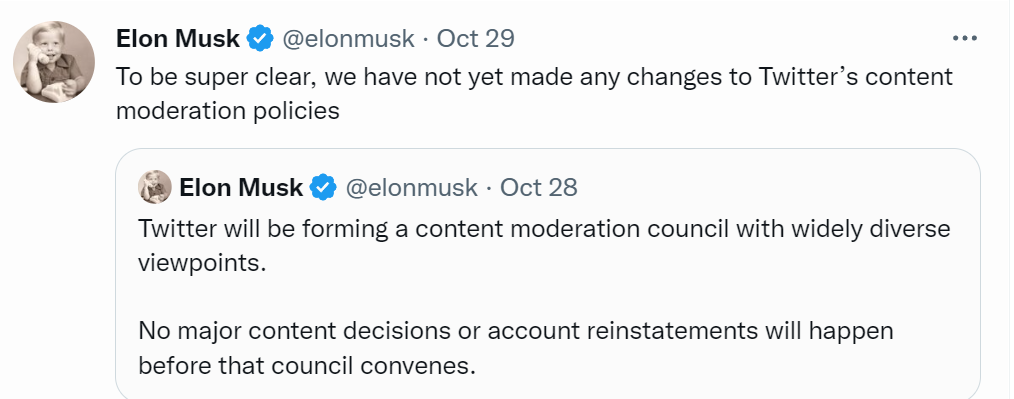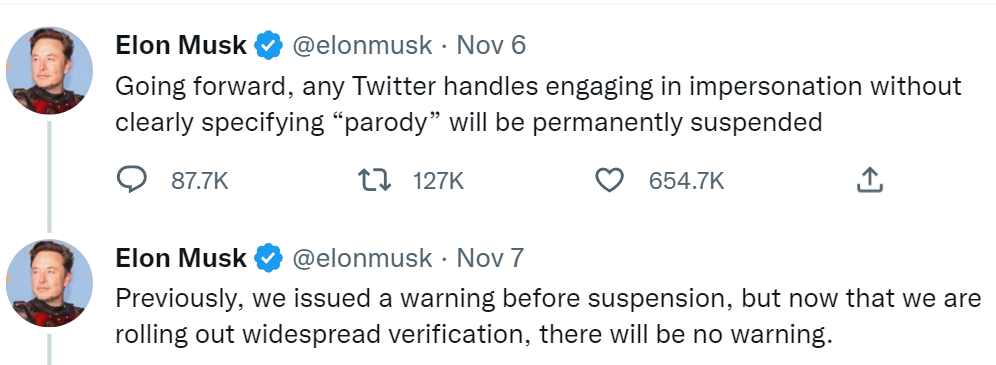Elon Musk, figure-head of SpaceX, Tesla and Neuralink, and the world’s wealthiest person, recently finalized his $44 billion deal to acquire Twitter. Despite his willingness to spend on it, the new owner admits to “obviously overpaying.”
Musk tweeted that Twitter usage is at an “all-time high.” Meanwhile, the platform’s revenue is in sharp decline, something he attributes to activities pressuring advertisers.
The transfer of ownership met a wave of controversy on social media and continues to be a polarizing issue. While some advocate for the planned policy changes, others fiercely condemn them.
But, what does Elon have in store for Twitter? And what will it mean for data privacy, internet censorship, and cybersecurity?
What’s Changing On Twitter Under Musk?
The billionaire made public statements about his plans for Twitter. These plans include advocating for free speech, making workforce cuts, charging for identity verification, encrypting private messages, and creating an open-algorithm transparency policy. He also plans on changing his revenue strategy to rely less on advertisers and more on paid ID authentication. Let’s explore his plans in more detail.
Twitter’s Content Moderation
Musk, who identifies as a “free speech absolutist” triggered a negative reaction from advocates of moderation for combating “hate speech.” Prior to Musk’s ownership, Twitter faced scrutiny for its vague and allegedly arbitrary censorship policies with employees admitting to censoring conservative voices for political reasons. While Musk agrees that Twitter’s previous ownership had a “strong left-wing bias,” other sources have highlighted an algorithmic bias toward conversative parties.
On several occasions, Elon has indicated that he wants to remove political bias from the platform’s algorithm, increase transparency, and make Twitter the digital equivalent of a “town square.” Many worry that reduced censorship and banning might lead to an increase in hate speech particularly affecting minority groups. Musk has yet to make any content moderation changes and account reinstatements.

Data Privacy at Twitter
Twitter has long faced scrutiny for how it handles user data. The company has a history of heavy fines for violating terms made with the Federal Trade Commission (FTC).
Whistleblower and former Twitter chief security officer, Peiter “Mudge” Zatko alleges that Twitter’s digital security is highly inadequate. He also claims that the company (under previous ownership) misled the FTC about its adherence to privacy policies.
As heads turn towards Musk to see how he deals with the inheritance of security issues, Peter Singer, strategist at the New America think tank, predicts Musk’s takeover will be a “net negative” for cybersecurity.
If you’re concerned about what data Twitter collects from you, it might be worth downloading the archive of your data to get a clearer understanding.
Twitter’s Workforce Cuts (Gone Wrong)
Musk cut 3,700 out of the original number of 7,500 Twitter employees. He attributes cuts to the fact that since his takeover, Twitter is “losing $4 million a day” due to “activist groups pressuring advertisers.”
While Musk comments that the severance packages offered to ex-employees was 50% more than the legal requirement, a class-action lawsuit has been filed against him for not complying with the 60 days of notice requirement.

While it’s difficult to predict what effect cuts will have on the company’s ability to enforce security, some worry it will have negative short-term repercussions. Zack Whittaker, a journalist at TechCrunch, reports that hackers are already seeking to exploit the identity verification changes.
Twitter Identity Verification Procedures at $8/Month
Twitter will now charge $8/month for an identity verification badge. Musk says this is a way of increasing account authenticity and filtering out bots. While Twitter is still accessible and usable without the blue badge, some criticize Musk for the decision.
There have been many instances of people impersonating Elon himself, and, under his new reign, this type of behavior would lead to a ban. However, he is offering the option to create parody accounts of other people, you just have to make this explicit by clicking the option to indicate that it’s a parody account.

From a cybersecurity perspective, it’s reasonable to hope it will lead to a reduction in spam accounts. Musk notes in a Tweet how increasing the cost of crime by “several orders of magnitude” could have a positive effect.
Cybercriminals often use fake accounts in social engineering attacks. Without the blue verification badge, it may be easier for users to spot inauthentic proposals and exploitation.
Twitter’s Private Message Encryption
In April of this year, Musk tweeted his view that Twitter should, like Signal, use end-to-end encryption for private messages. The move would protect information in private chats and prevent hackers from spying on your private Twitter conversations. He has yet to make this an official plan, but hopes are high in the cybersecurity sphere that he will follow through.
Open Algorithm
In light of scrutiny Twitter faced over the years for allegedly downgrading or “shadow-banning” accounts of users, Musk pledged to make the Twitter algorithm open to public watch. Some admire the effort toward transparency and believe the move will evoke public trust.
That said, CyberScoop’s Tonya Riley worries that disclosing the code “exposes potential vulnerabilities that criminals and disinformation operators can use to sow havoc.” She’s probably inferring that hackers with enough technical prowess could use the code as insight for infiltrating Twitter. A sophisticated attack could be devastating for Twitter users, and for the platform itself.
The West’s Version of China’s WeChat?
During a brainstorming meeting about Twitter’s future, Elon Musk reveals his desire to “copy WeChat.” WeChat is China’s all-in-one social media, payment, dating, and everyday life app. While there’s obvious merit in centralizing daily operations into a single app, this intention raises concerns about privacy.
WeChat is monitored by the CCP, which uses the app to track citizens’ movements, purchases, and conversations. The CCP can censor and punish those who speak out against the party’s ideology. In the interview, Musk clearly shows admiration for WeChat and one can hope he isn’t harboring a secret agenda to turn Twitter into a centralized hub for mass surveillance… Right?
Is Your Information Safe with Twitter?
Are you concerned about your internet privacy? If so, it’s worth using a VPN to cover the tracks of your online activity. VPNs make it harder for hackers, advertisers, and surveillance bodies to monitor your online activity. They do this by assigning a new IP address to your device, disguising your device’s real IP address.
However, it’s important to understand what VPNs can and can’t do, and protecting you from social media tracking while you’re logged in is not one of them.
CyberGhost VPN uses end-to-end encryption to protect your personal information from falling into the wrong hands. With regular internal audits, a successful independent audit by Deloitte, and quarterly transparency reports, it’s among the world’s best VPN services. Download CyberGhost VPN today.



Leave a comment